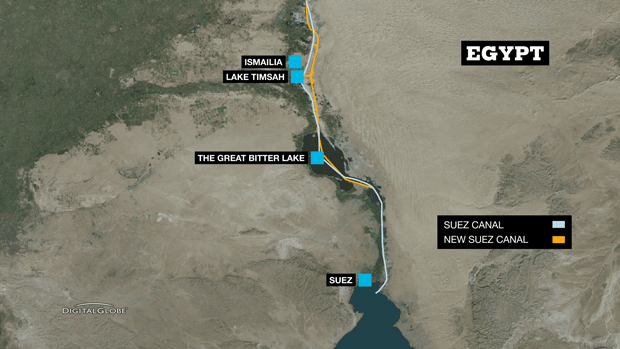PBS: Escaping Eritrea … [Read More...] about ካብ ውሽጢ ቤት ማእሰርታት ኤርትራ
Video: How the Suez Canal made history
2015-08-06, France24
More than a century after the Suez Canal was inaugurated, Egyptian President Abdel Fattah al-Sisi unveils a giant canal expansion. FRANCE 24 takes a look back at a waterway that has changed the course of history.
The dream of cutting a canal that would connect the Red Sea to the Mediterranean had long gripped cartographers, engineers and dreamers through the centuries. But it was a driven, obsessed former French diplomat who succeeded in turning “a mere dream” into reality.
Five years after Ferdinand de Lesseps persuaded the Viceroy of Egypt, Mohamed Said, to permit the building of a shipping canal through the 100 miles of desert between Africa and Asia, construction began on the historic waterway.
The canal was built using forced labour, with hundreds of thousands of Egyptian peasants drafted into low-wage digging work with hand tools. Thousands died before the practice was banned and steam-powered excavators took their place.
In 1869, the canal was inaugurated to much fanfare and international acclaim. The newly opened shipping link officially belonged to Egypt, but it was de Lessep’s Suez Canal Company that held the concession to operate it for 99 years. The company was initially a Franco-Egyptian corporation, but in 1875, imperial Britain bought out the Egyptian shares from Mohamed Said’s successor, Ismail Pasha.
“Egypt paid a very high price for digging the Suez Canal. In return, what did the Egyptian people get? Occupation,” explained Mohammed Ezzat Adel, a former chairman of the Suez Canal Authority, who was one of dozens of men entrusted by former Egyptian President Gamal Abdel Nasser to take over the canal in 1956.
The Suez Canal provided colonial Britain with a vital shorter shipping route just as oil began to dominate international economic interests. Shortly after World War I broke out, Britain declared Egypt a protectorate and dispatched British and Indian troops to protect the Suez Canal from a Turkish assault.
During World War II, fighting ebbed and flowed along the northern African coast until British and Commonwealth troops finally managed to push back the Axis powers.
Codeword ‘de Lesseps’
More than a decade after the end of World War II, the canal sparked a crisis that would change the course of modern history. On July 26, 1956, during a speech delivered in the Egyptian port city of Alexandria, Nasser announced the nationalisation of the canal amid deteriorating Anglo-Egyptian relations. During the speech, the Egyptian leader uttered the word “de Lesseps” several times. It was the codeword for the army and senior engineers such as Adel to start the seizure and nationalisation of the canal.
Recounting his experience that historic day, Adel described how his group started by taking control of the Suez Canal Company headquarters in Ismailia. “We moved to Ismailia on the same day of nationalisation – and took over the offices in Ismailia, Port Said and Cairo.” Hailed as a victory for Arab nationalism, the move angered France and Britain and a plan was hatched to launch a military offensive to regain control of the Suez Canal – using an Israeli attack as a pretext.
As Israeli troops attacked the Sinai according to the secret plan, Britain and France issued a call on both sides to cease fire. When Egypt refused, British war planes began bombing targets, as Anglo-French troops landed ashore. But the US, under President Dwight Eisenhower, objected to the British-French-Israeli invasion, putting pressure on British Prime Minister Anthony Eden by refusing to allow emergency IMF loans to the UK unless the invasion was called off.
On November 2, a US resolution demanding a ceasefire was passed by the UN with Russia voting with the United States, bringing an end to the conflict. Just over a decade later, a battle for supremacy raged over the waterway once again with Israeli forces occupying the right bank of the channel. It was a conflict that halted maritime traffic for eight years due to an Egyptian blockade.
Since then, the Suez Canal has undergone significant expansion to allow for an ever-increasing flow of increasingly larger vessels.

